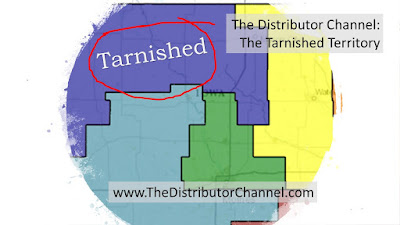You've Just Taken Over an Abandoned/Ignored Territory
 The Tarnished Territory
The Tarnished TerritoryCongratulations you’ve just been assigned to a new territory. More precisely, it’s new to you. There was a salesperson in place in the past, but you had no real overlap and no chance to conduct even a minuscule amount of territory debriefing. Reflecting on the situation, you don’t know if customers liked the guy, hated the guy or even knew him. The quality and quantity of their work is a mystery. All we can say for sure is they’re gone and you’re here.
It’s fairly common for salespeople to change jobs. There is a laundry list of reasons for the departure; some good, some bad. There are a few points you should know about departed - but not dearly departed - salespeople:
• Not everybody liked them. Customers may have done business, even considerable business, with them and still found they weren’t really the perfect match.
• Those in your own company will often magnify their faults and flaws. Issues in the territory may be blamed on the person no longer with the company, regardless of true fault.
• In those unfortunate cases where the seller left to join a competitor, the previously mentioned points remain true. Sadly, many companies hire salespeople in the hopes they will magically bring all of their customers with them. It usually doesn’t work that way.
The situation
Sticking with rapid-fire bullet points, let’s toss out a few assumptions about the territory in question:
• There is no sales momentum. Sales numbers have slumped as customers fell prey to competitors.
• Some customers have wandered away completely; finding new sources for the products your company sells.
• Customers have not seen new and improved products from your organization.
• A few customers will question your organization's dedication to serving them. People take that personally.
• Many will continue to purchase products out of habit, but the competition is probably working on that.
• Exclusive products available only from your company are least impacted.
• Your company has sales records but often lacks the ability to understand who made the buying decision.
• Some customers are still dealing with your customer service, inside sales and technical support people.
Building a strategy
Understanding and becoming engaged with your customers quickly is the key to success. Your past records, the inside sales team, product support people and supplier salespeople are the key to acquiring customer information. Your first efforts should be devoted to those who are still making purchases even if the dollar amount is small enough to easily overlook
Past Sales Records – Review sales history for accounts in your territory. If possible, extend your search back two or three years. This will flush out those accounts who have previously done business with your organization; perhaps catching some of the efforts of the salesperson preceding you. If your computer system allows it, look not only at total purchases, but also individual items purchased.
Items purchased will give you an idea as to the extent of each customer’s use of your products. Look especially for items which fall into these categories:
• Products/brands for which you have an exclusive (or near-exclusive) offering.
• Products which your company is known for stocking larger quantities over others in your geography.
• Products which require some level of technical support.
If you don’t know which products or technologies fall into these categories, I recommend a conversation with your sales manager; they should know.
 |
| Your Inside Sales and Customer Service teams have a wealth of information. |
• Was price an issue with the accounts or did they tend to buy at the regular system price?
• How quickly did the customer need their products? A history of expedited shipping requests may be an indication of using your company for emergencies rather than the normal flow business.
• Who did the inside salesperson deal with and what was their attitude? It is not uncommon for your inside and customer service people to deal primarily with purchasing/procurement types. But lacking another connection, a procurement person is better than a blind phone call.
After you prioritize your accounts, you may actually want to ask these folks to further serve you by asking each of the account contacts whether they have had an opportunity to meet you and by asking if there are others you should be calling.
Product support people come under a number of headings. They might be specialists, application engineers or just plain technical support resources. Most distributors have someone like this on staff. These people are important because they rarely work with procurement. Instead, their work focuses on engineering, technicians, and users of the products sold. They often continue relationships with customer contacts long after the last sale has been made. Conversations with them should focus on customer contacts they know and the potential need for technical support in your new(ish) territory.
Whenever they do have a relationship, I recommend asking them to make personal introductions with your customer base. They should lay out when it is best to contact these customers. Further still, I would ask them to review your accounts for customers who should use their services but do not. Specialists, in particular, might be able to suggest products for introduction to specific customers.
Supplier salespeople are sometimes overlooked when it comes to helping new distributor sellers. The range or distributor salespeople opinions go from benevolent to blistering. Here is a sampling of thought:
• Supplier salespeople don’t know the accounts well enough to make a decent introduction or recommendation.
• Supplier salespeople aren’t willing to share their contacts because you might fail to perform to their standards (whatever those happen to be) in the future.
• Suppliers have other distributors and since your territory didn’t have a salesperson assigned, they allied themselves with another distributor.
• Suppliers using Manufacturer’s Reps (Agencies) have alliances to their other lines and see your company as a disrupter for lines sold by other distributors.
Notice we didn’t specifically mention laziness, sloth or
 |
| Make no mistake, these salespeople are not lazy. |
Territory planning with supply-partner teams is best handled in person. The following information moves the discussion along:
• Accounts with existing business for their product groups.
• What you have learned from conversations with your own teams.
• Any additional information you may have developed in initial calls to the facilities.
Once this information is shared, you move into the “asking” mode. Here are the topics to cover:
• Are there any accounts where the salesperson would not be able to support your selling efforts? While the answer to this one might be painful, there are times and situations where the supplier has made commitments to other distributors or has some other reason for not supporting your sales efforts. It’s better to get it out in the open before investing energy with the supplier.
• Do open issues exist which require your attention? This runs the gamut from product delivery promises missed and pricing issues to technical support and warranty problems.
• Are there any key people I should talk to? Supplier teams often know people they have had conversations with on projects and product questions. These are great door openers.
• Do you ever have leads for my territory and if you send them to me, what would you like to have back in the way of information? Most suppliers have leads (from time to time), but they are concerned the leads won’t be properly followed-up. Understanding their priorities is good for nurturing the flow of leads coming in the future.
What to do with this information?
Obviously, you want to make sales. Your boss is probably impatient. You need to get something going…and soon! We’ve talked about gathering information. Making calls without this data is not only inefficient but also makes you appear to be just another “drive-by-sales guy”.
Stay Tuned
Next time we’ll delve into the nuts and bolts of using our data to make intelligent sales calls.
_____________________________




Comments